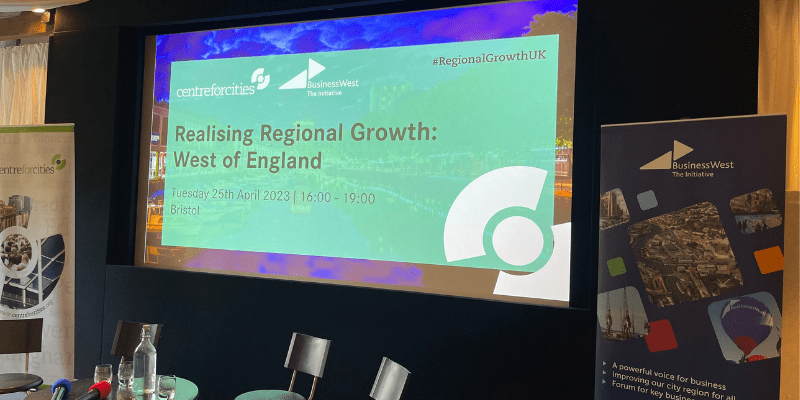
Innovative, thriving, dynamic, successful. The West of England is all those things, and plenty more.
But at the heart of the most economically productive region outside London sits contradictions that can vex those who live and work here.
At the recent Realising Regional Growth event hosted by Business West and Centre for Cities, we heard experts’ perspectives about what makes our region successful and where challenges to continued growth lie.
Good growth points
Speakers highlighted significant plus points including our universities’ impact as employers and supporters of innovation and spin-offs. Advanced manufacturing hubs of excellence like the National Composites Centre in Emersons Green are shaping solutions to pressing challenges around future transport, clean energy and supply chains.
A significant constellation of efforts promises to bring decent jobs, homes and world-leading educational facilities to Bristol’s regenerated Temple Quarter area. I’ll come back to this work shortly.
The region’s thriving creative, technology and high-end manufacturing sectors, supported with a highly skilled workforce, help us buck the trend when compared to other cities outside London.
Centre for Cities’ chief executive Andrew Carter explained that other regions grappled with post-industrial decline in recent decades, while Bristol grew continually throughout the last century and a half. One slide (below) set out jobs growth in Bristol compared to Manchester since 1841 to illustrate this trend.
“Most other parts of the country would bite your hand off to have the assets you have in the West of England,” he added.
It is easy to forget this in the day-to-day of living and working here. But none of this is to overlook the real and pressing challenge, which is that too many people do not feel like they share in this economic success. This is the test against which any claim to genuinely inclusive long-term growth should surely be measured.
Managing growth pains
“Bristol makes a good offer to this part of the world,” said the city’s elected mayor Marvin Rees.
“It offers good opportunity, but also a lack of opportunity, where 25% of people living here live in poverty.”
University of Bristol’s Vice Chancellor Evelyn Welch highlighted how this difference in life chances translates into participation in higher education. She said that while ‘100% of Clifton kids’ are likely to go to university, just 8% of young people living in other parts of Bristol take the same path.
And we face a housing affordability challenge which increasingly prices people out of living here. Having the right type of homes in the right places, supported by good, reliable transport represents an existential challenge. The session heard concerns from the floor about whether our planning system has the resources to support the change that’s needed.
But change is happening, with partners’ support.
The regeneration of Temple Quarter responds to these challenges and others. The project aims to create 22,000 jobs and 10,000 new homes, whilst bringing £1.6bn every year into the local economy.
Alongside this, the University of Bristol’s flagship Temple Quarter Enterprise Campus is set to provide creative, digital and innovation space on the site of the former sorting office building beside Temple Meads station.
Nearby at Temple Island, Legal & General is progressing with proposals to provide 500 new homes, office space for up to 2,000 people, a hotel and conference centre.
In explaining the rationale for their Temple Island venture, John Godfrey, Legal & General’s Director of Levelling Up, said they invested in areas with strong local visions, willingness to work in partnership and capacity to deliver. It’s a formula, he says, that’s guided Legal & General’s investment in transformational projects over the last decade spanning back to Salford’s Media City. Plans for Temple Island are out for consultation as I write this.
Meeting the challenge
Taken together, these efforts to support skills, provide infrastructure and create opportunities speak to the challenges that cities everywhere face.
How do we put the right homes in the right places to connect people with opportunities? How can places support change to how people live, work, travel and buy things and not just respond to them? How can this happen whilst protecting our climate and natural environment? How can everyone benefit from the opportunities that growth provides?
These are big questions that many different projects and programmes seek to address.
As a communications professional and small business owner, I strongly hope that as many people as possible are involved in conversations about the city’s future.
Big changes are coming to our city region. The benefits of addressing the challenges we face are too big to miss. We can do it better if we do it together.
Here are the slides from the session
Ben Lowndes is Director at Distinctive Communications, an integrated communications agency based in Temple Quarter.
- Log in to post comments

The Bristol Initiative
Want to know more about the benefits of being an Initiative member and who can join? Click the button belw to get in touch.

